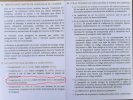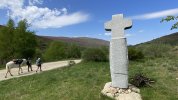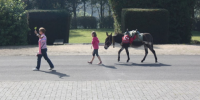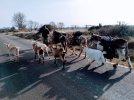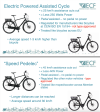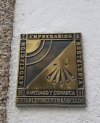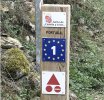It's not the same, actually.
Just to clarify for those who have never owned an ebike, those of the "pedelec" type (equated with bicycles according to EU regulations) provide only a percentage of the energy required, the rest must be supplied by the cyclist at any time (the US regulation is very different and allow the use of a "throttle", but this would be equated to a motorbike in EU). And on a climb, or on a steep descent off road the effort required can be significant. In some cases you have to get off and push.
I feel that those who made these regulations do not really know what an ebike is.
I have never owned a horse but I imagine the situation is different and the effort is much less. Correct me please if I am wrong, but I imagine that those who do it on horseback also walk stretches if they want to, or need to stretch their legs, and still they can leave their backpack on the horse. Or can't they? Even from a "maintenance" perspective, changing a tire on a bike, or an ebike, can take a good portion of an hour. But I don't know how long it takes to change a ... horseshoe

.
And if something breaks, all that's left is to push.
Said that, equating 200 km of bicycles with 100 of people on foot also seems deeply unfair to the walker to me. With a minimum of preparation a person on an "muscular" bicycle can tackle routes of 50 or even 100 km DAILY with the same effort with which a person on foot does 25 with a backpack. Even less. And less potential injuries.
I have only one question: once clarified that the "compostela" is an internal matter for believers, or for those who make it an essential issue (which I totally understand and
respect), the issue may be the access to hostels:
is it possible while doing the Camino with an ebike?
If not, I think this is unfair, since the Camino-related network has often benefited from Government or European assigned funds (FEDER), paid for by all citizens, and so I think that rules would be discriminatory.
But this is not clear from what I read in the document posted at the beginning.
